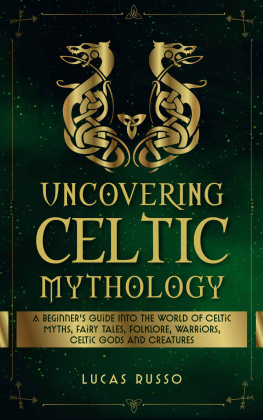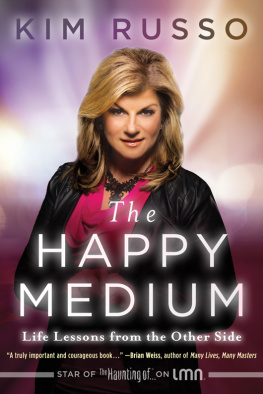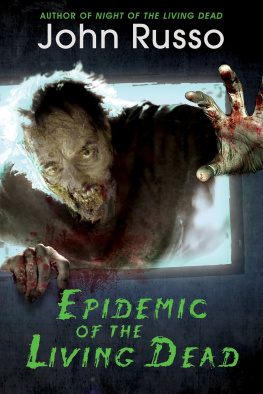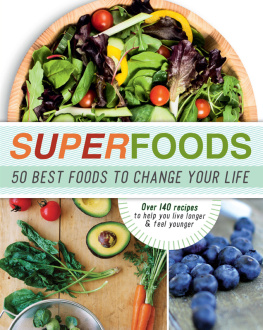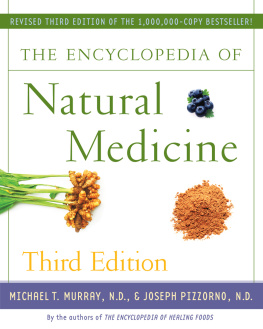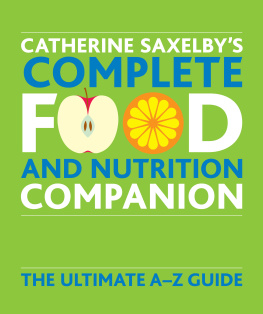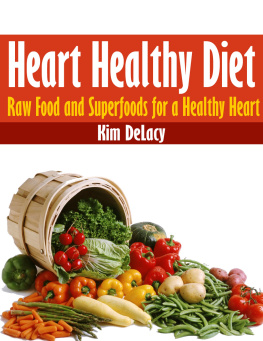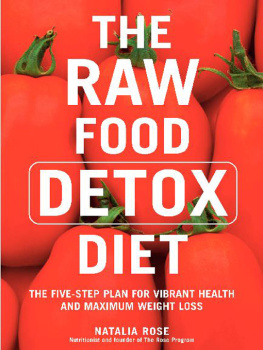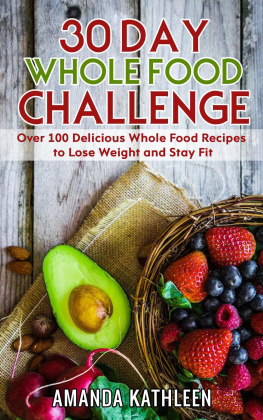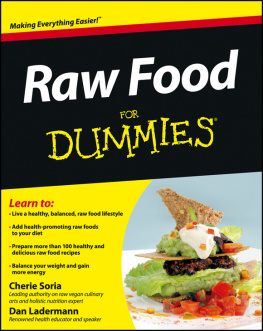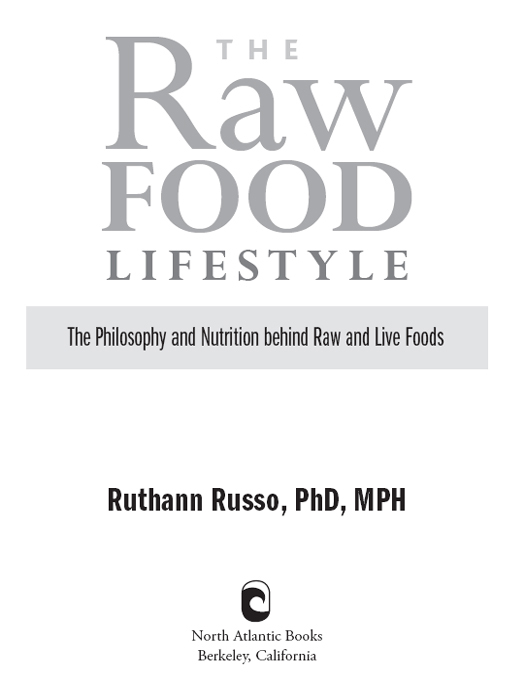
Ruthann Russo is an educator, health counselor, and passionate raw foodist. She is a member of the faculty at Tri-State College of Acupuncture where she teaches complementary and integrative medicine and directs the community acupuncture program. She has personally instructed more than 3,000 physicians in hospitals across the country, including hospitals affiliated with the University of Maryland, University of Pennsylvania, University of Massachusetts, and Johns Hopkins University. She earned a law degree from American University, a masters degree in public health from Robert Wood Johnson School of Medicine, and a PhD in business administration from Touro International University. She is a certified holistic health counselor with the Institute for Integrative Nutrition and Columbia University Teachers College. Russos previous book, 7 Steps to Your Best Possible Healthcare, as well as her program HealthMap, helps healthcare consumers create plans for their own health that reflect their personal values, vision, and mission. She has been a vegetarian and vegan for more than twenty years and a raw-food enthusiast since 2007.
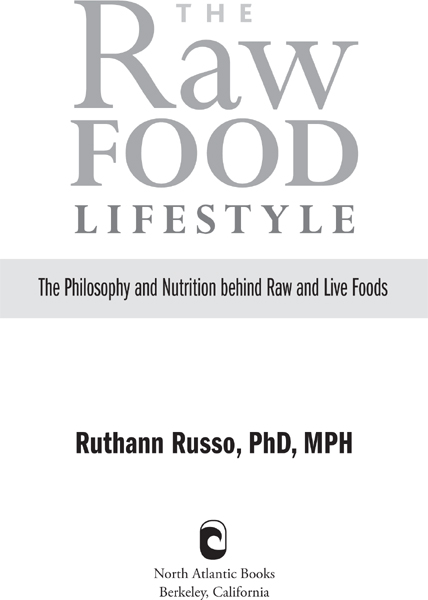
Contents

Chapter 1
Chapter 2
Chapter 3
Chapter 4

Chapter 5
Chapter 6
Chapter 7
Chapter 8
Chapter 9
Chapter 10
Chapter 11

Chapter 12
Chapter 13
Chapter 14
Chapter 15
Chapter 16
Chapter 17

Introduction and Overview of
Raw and Living Food Principles
Raw food is more than just a diet, its a lifestyle. Raw food is also a revolutionary philosophy. A revolution is a fundamental change in the way of thinking about something. The raw food movement looks at the way food, living, our treatment of the earth, our treatment of each other, and our quest for physical, spiritual, and mental health all fit together. Therefore, it is also a philosophy. The purpose of this book is to introduce you to the revolutionary philosophy of raw and living foods by pulling together all of the components, including diet, into one place. The book provides you with information to make a conscious decision about whether you will incorporate any of the raw and living food philosophy into your own philosophy of living.
Raw versus Living Foods
The terms raw and living are often grouped together when describing foods. And in some places in the book I use them interchangeably. It is, however, essential to clarify the difference between the two terms. Living foods are those that still have live enzymes circulating in themthe more, the better. Examples of living food include uncooked broccoli, romaine lettuce, and apples. Within the context of this book, raw foods are any foods that are grown and then eaten in their uncooked form. If it wasnt grown in the ground (on a plant, a tree, a vine or as a root), its not raw or living. You can eat fish, meat, and even milk and cheese products raw. These foods, however, are part of a diet that includes animal products and are not addressed in this book. Examples of raw foods that grow in the ground include raw almonds, pumpkin seeds, and lentil beans. You can revitalize these foods by soaking them, which causes them to sprout. During this time, they begin to produce enzymes again.
While all living foods are raw, not all raw foods are living. It is possible to revitalize many raw foods through the sprouting process. However, not all raw foods can be sprouted. Examples of raw foods that cannot be revitalized through sprouting include raw cacao beans (from which chocolate is made), sweeteners like agave, maca, mesquite, and dried herbs. Degree of life, as we will see, is a point of contention within the raw and living food movement. But if you understand this and the differences inherent in living versus living and raw foods, you will be able to make some good decisions regarding your own nutrition.
The Definition of Uncooked
The raw food movement is a return to natural, almost biblical practices. For example, in the Essene Gospel of Peace, Jesus is quoted as saying, Live only by the fire of life, and prepare not your foods with the fire of death, which kills your foods, your bodies, and your souls also.variety to the raw and living food diet. Instead of just fruits and vegetables, you can use the dehydrator to make foods like flatbread, dried fruit, and crackers to spice up your meals.
Enzymes Can Improve Your Life
Eating only foods that are uncooked or heated up to 115F allows the food to retain enzymes that are destroyed in the normal cooking process, which for most of us is 350F to 425F. Enzymes are essential for digestion. If we allow the foods we eat to retain their living enzymes, then our bodies rely on those enzymes, making our own digestion process more efficient. Essentially, eating raw and living foods allows our body to use its energy to stay healthy and not produce as many enzymes. We also free our bodies from digesting the unnatural and sometimes toxic substances contained in cooked, processed, genetically modified, or pesticide-infested foods when we eliminate these kinds of foods from our diets. Living foods also have a high level of energy that translates into higher energy levels for us when we eat them. Other components of the philosophy include treating everyone and everything with respect, including ourselves, the food we eat, the earth, and others.
Every revolution, including the raw and living food movement, has its leaders. It is difficult, however, to pin down just one leader. Dr. Norman W. Walker published and taught vibrant health, his version of raw foodism, from the early 1900s until his death in 1985. And Dr. Ann Wigmore published and taught natural living, her version of raw foodism, from the 1950s until her death in 1994. In 1960, Viktoras Kulvinskas started the Hippocrates Health Institute with Dr. Wigmore and continued her work. Since then, many leaders, each an expert in one or more spheres of raw and living food philosophy, have surfaced. Gabriel Cousens, MD, MD(H), DD, has developed and shared his philosophies on spirituality and nutrition. David Wolfe has pioneered the way for Americans to obtain easy access to high-quality living foods. Victoria Boutenko has passed on to us her approach to transitioning your entire family from a processed diet to a raw diet. Joel Fuhrman, MD, has conveyed the mainstream physicians approach to fasting, which is an important component of the raw and living food lifestyle. The extent to which the raw and living food philosophy has been adopted by individuals around the world is due in large part to the open and collaborative efforts of these leaders.


